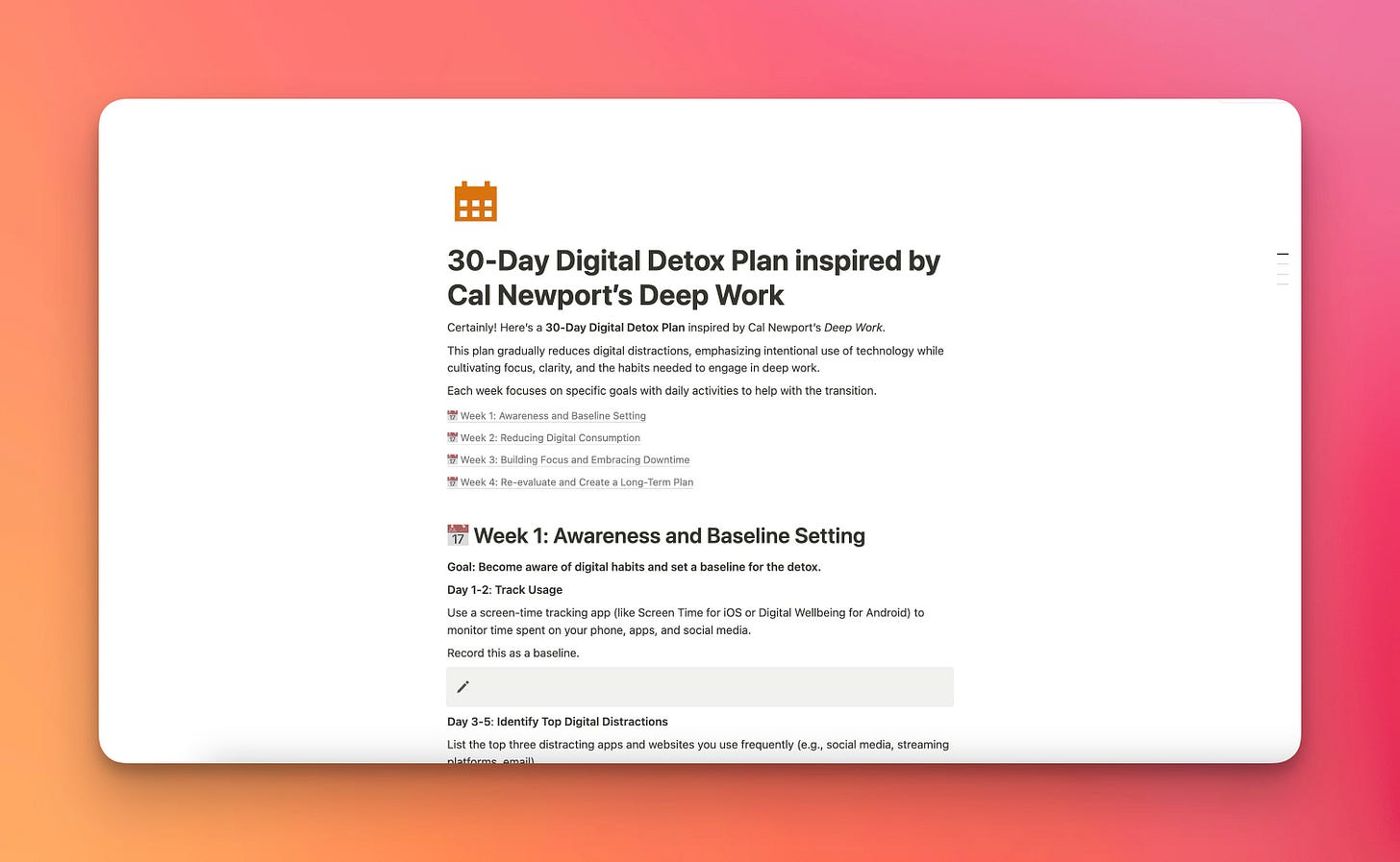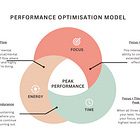Game-changing Strategies to Master Deep Work for Solopreneurs
Unlock game-changing strategies for solopreneurs with Cal Newport’s deep work principles. Learn how to enhance focus, cut distractions, and boost productivity in your solo business.
As a solopreneur, you’re juggling everything: client work, marketing, admin, and all the little tasks in between.
But the constant ping of notifications and an endless to-do list can make deep, focused work feel impossible.
Cal Newport’s book, Deep Work: Rules for Focused Success in a Distracted World, outlines strategies for reclaiming that focus, and his principles can be a game-changer for solo business owners.
Read about “What I Learned From “Deep Work: Rules for Focused Success in a Distracted World”
In this post, we’ll dive into Newport’s core concepts and adapt them for the unique needs of solopreneurs.
With actionable strategies for building a focused routine, reducing distractions, and cutting down on shallow work, you’ll learn how to free up more time for what really matters—growing your business.
The Power of Deep Work for Solopreneurs
Deep work is all about setting aside dedicated, uninterrupted time to work on high-impact tasks.
Unlike shallow work, which includes low-value activities like checking emails or scrolling social media, deep work pushes your cognitive abilities to their limits.
It’s the kind of focused work that leads to breakthroughs and real progress.
For solopreneurs, who often don’t have the luxury of delegating tasks, mastering deep work can be transformative.
When you make time for high-impact activities, such as developing new offerings, writing valuable content, or strategising for growth, you’re directly investing in the future of your business.
The Four Rules of Deep Work
Rule 1: Work Deeply – Create Focused Routines
The first rule Newport shares is to “Work Deeply,” which means creating structures and habits that allow you to focus without distractions.
For solopreneurs, this can mean setting up dedicated “deep work” blocks where you turn off all interruptions and focus on tasks that move the needle.
Strategies for Solopreneurs:
Time Blocking: Dedicate specific blocks of time to deep work each day. For instance, you might set aside two hours each morning for tasks like writing, designing, or planning. During these blocks, silence your phone, shut down your email, and let others know you’re unavailable. Consistency is key, so try to keep the same schedule every day.
Rituals to Start Focused Work: Develop a ritual that signals to your brain it’s time for deep work. This could be as simple as making a cup of tea, putting on noise-canceling headphones, or clearing your desk. These little signals help create a “deep work mindset” so you can dive in faster.
Set Goals for Each Session: Before you start, decide exactly what you want to accomplish. For example, “finish writing blog draft” or “plan the next two weeks’ content calendar.” Having a clear outcome makes it easier to stay focused and ensures each session is productive.
Rule 2: Embrace Boredom – Train Your Brain to Focus
Newport argues that our brains are losing the ability to focus because we’re constantly seeking stimulation—checking phones, scrolling social media, or responding to every notification.
As a solopreneur, training yourself to sit with boredom and resist distractions will make deep work easier and more rewarding.
Strategies for Solopreneurs:
Digital Minimalism: Start by reducing unnecessary digital distractions. Try designating specific “no-phone” times during the day, especially during your deep work sessions. Put your phone in another room, or use apps like Freedom or Focus@Will to block distractions.
Single-tasking Practice: Practice focusing on one thing at a time, even with everyday tasks. Whether it’s reading an article or cooking a meal, resist the urge to multitask or check your phone. This helps build your attention span over time.
Breaks Without Screens: Instead of reaching for your phone during breaks, take a walk, meditate, or simply sit and daydream. These “bored” moments give your brain a chance to recharge and strengthen your focus muscle.
Rule 3: Quit (or Limit) Social Media – Reduce Low-value Distractions
For solopreneurs, social media can feel like a necessary evil. But Newport argues that it often does more harm than good, pulling us away from focused work and filling our minds with low-value content.
The solution?
A strategic, intentional approach to social media.
Strategies for Solopreneurs:
Audit Your Social Media Use: Ask yourself if each platform truly adds value to your business. Are you getting clients, building connections, or learning something useful? If not, consider quitting or limiting that platform. You may be surprised at how much time (and mental energy) it frees up.
30-Day Social Media Detox: Take a temporary break from social media and note any changes in your productivity and focus. Many solopreneurs find that they’re able to accomplish far more without the constant distraction.
Download the FREE 30-Day Digital Detox Plan inspired by Cal Newport’s Deep Work
Scheduled Social Media Time: If social media is necessary for your business, schedule specific times for it rather than checking throughout the day. For example, allocate 15 minutes after lunch to check notifications, respond to comments, and post content. This helps keep social media from spilling over into your deep work time.
Rule 4: Drain the Shallows – Minimise Low-value Tasks
Shallow work—the repetitive, low-value tasks that don’t directly contribute to your goals—can eat up a huge portion of your day.
For solopreneurs, minimising shallow work can mean delegating, automating, or batching low-value tasks to make room for deep work.
Strategies for Solopreneurs:
Batch Similar Tasks: Group shallow tasks, like answering emails or handling administrative work, into a single time block each day. By dealing with them all at once, you prevent these tasks from interrupting your focus on higher-priority projects.
Automate Repetitive Processes: Use automation tools wherever possible. For example, use scheduling apps for social media posts, invoicing software to streamline billing, or automated email responses to answer common questions. Automation reduces the time you spend on shallow tasks, so you can focus on what matters.
Set Boundaries with Clients: Let clients know your working hours and response times. For instance, you might only respond to emails within a specific window each day. This helps reduce interruptions and allows you to prioritize deep work sessions without feeling guilty.
Training Focus Like a Muscle
Just as you’d build physical strength gradually, Newport suggests training your focus gradually too.
Start with shorter deep work sessions, then extend them as your ability to focus grows.
Tips for Building Focus:
Pomodoro Technique: Start with 25-minute work intervals (Pomodoros) followed by a 5-minute break. Gradually increase these intervals as you become more comfortable with uninterrupted work. Eventually, aim for 60- to 90-minute deep work sessions.
Incremental Focus Training: Set a goal to increase your focus time each week. Start with a 30-minute session, then 40, then 50. Over time, you’ll build the stamina needed for longer, more productive work sessions.
Celebrate Small Wins: Give yourself credit for each successful deep work session. Building focus is challenging, so recognize your progress along the way to keep yourself motivated.
How Deep Work Can Transform Your Solopreneur Journey
Mastering deep work can be a turning point for any solopreneur.
Writers and Content Creators: Many writers set aside early morning hours for uninterrupted writing. This not only increases productivity but also leads to higher-quality work.
Tech Entrepreneurs: Founders who batch administrative work and limit email to set times often find they have more energy for creative, strategic thinking.
Service-based Solopreneurs: Coaches and consultants who dedicate time to skill-building, strategy development, and content creation often outpace competitors who spend more time on shallow tasks.
The common theme?
Solopreneurs who prioritise deep work gain a significant edge, producing more valuable work without burning out.
Deep work isn’t something you achieve overnight but it’s a skill you develop gradually.
So, start small, build routines that support focused work, and embrace moments of boredom to train your mind for the work that matters.
In a world full of distractions, solopreneurs who cultivate deep work have the potential to achieve more, work smarter, and find greater fulfillment in their solo journey.
Ready to take the plunge into deep work?
Implement these game-changing strategies, and watch how it transforms your business.
If you have any questions or want more tips on applying these principles, let’s chat! And remember, every deep work session is a step closer to mastering your craft and reaching your goals.
What we choose to focus on and what we choose to ignore—plays in defining the quality of our life.
― Cal Newport, Deep Work
Find out how Focus + Time + Energy = Peak Performance
When all three come together, you’re at your best. You are able to maximise your focus, energy, and time for the highest level of output and efficiency.
Like this post? Consider doing these 2 things:
"The Solopreneur Code" is targeted towards solo entrepreneurs, providing insights, tips, and strategies for success in running a business independently, share with your community if you think this is helpful for them.
Have a question? Comment below!
For just $9.00/month or $69.00/year (36% cheaper than subscribing monthly), you’ll gain access to exclusive strategies, insights, and tools that can take your solopreneur journey to the next level. You’ll also unlock all content and advanced mega AI prompts for your business.
I hope you’ll take this step and join me today.
Let’s crack the growth equation and build a thriving one-person business on your terms!
Anfernee






I can say personally that time-blocking has increased my focus and productivity greatly. Thanks for the inspiration to further implement deep work to my practices!